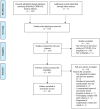Universal Testing Policy for COVID-19 in Pregnancy: A Systematic Review
- PMID: 35211434
- PMCID: PMC8861085
- DOI: 10.3389/fpubh.2022.588269
Universal Testing Policy for COVID-19 in Pregnancy: A Systematic Review
Abstract
Background: The coronavirus disease (COVID-19) has spread at an accelerated rate. WHO reported that in the general population, the majority are either asymptomatic or mildly infected. In view of the high risk of SARS-CoV-2 transmission from a pregnant woman to her newborn, healthcare workers and other patients, it is a raised concern whether universal testing should be implemented in this targeted population. The current guidelines have not recommended a universal testing policy. In certain European countries, however, the policy was implemented by some hospitals in regions with high prevalence of COVID-19 infection.
Aims: To assess the justification for universal screening of pregnant women for COVID-19 prior to admission in labor through systematic review of antenatal prevalence of asymptomatic infection, hence risk of inadvertent spread of infection.
Materials and methods: Three databases confined to PubMed, Ovid and Science Direct were used to search for articles from November 2019 onwards published in the English language. The search was conducted using the keywords "COVID-19" or "coronavirus" or "SARS-CoV-2" and "pregnancy" or "pregnant" or "obstetric" or "labor" and "universal" or "testing" or "prevalence". The review was registered with PROSPERO.
Results: The search result retrieved 34 studies, with the majority consisting of retrospective cohort studies, while other studies such as prospective cohort study, research letters and a case series were also identified. A total of 19,958 pregnant women were universally tested until the date of report. Overall, the prevalence of universal testing among pregnant women presenting to labor and delivery units are higher in Western regions. From the total number of pregnant women 5.3% tested positive and among these, the majority (75.5%) did not manifest any symptoms at the time of testing.
Conclusion: In areas with high prevalence of COVID-19 infection, the implementation of a universal testing policy among pregnant women presenting to labor and admission units may be cost effective in helping to curb disease transmission.
Systematic trial registration: https://www.crd.york.ac.uk/prospero/display_record.php?ID=CRD42020184248, PROSPERO: CRD42020184248.
Keywords: policy; pregnancy; prevalence; severe acute respiratory syndrome coronavirus 2; universal testing.
Copyright © 2022 Hashim, Mahdy, Abdul Rahman, Kalok and Sutan.
Conflict of interest statement
The authors declare that the research was conducted in the absence of any commercial or financial relationships that could be construed as a potential conflict of interest.
Figures
References
-
- World Health Organization. WHO Coronavirus Disease (2019). (COVID-19) Situation Report 46. (2019). Available online at: https://www.who.int/docs/default-source/coronaviruse/situation-reports/2... (accessed July 24, 2020).
-
- John, Hopkins Medicine. COVID-19 Story Tip: Universal Testing May Help Reduce COVID-19 Infections, Deaths in Long-Term Care Facilities. Available online at: https://www.hopkinsmedicine.org/news/newsroom/news-releases/covid-19-sto... (assessed July 24, 2020).
-
- National Institute of Health COVID-19 Treatment Guidelines . Available online at: https://covid19treatmentguidelines.nih.gov/overview/management-of-covid-19/ (accessed June 22, 2020).
Publication types
MeSH terms
LinkOut - more resources
Full Text Sources
Medical
Miscellaneous


